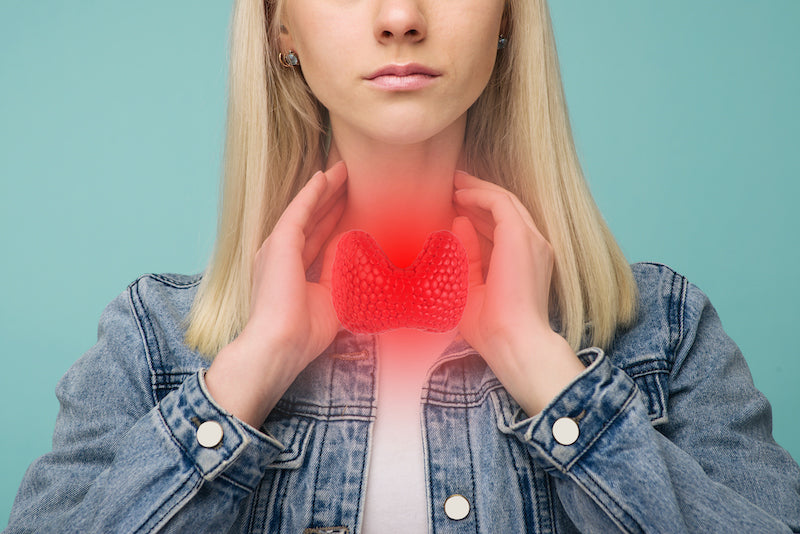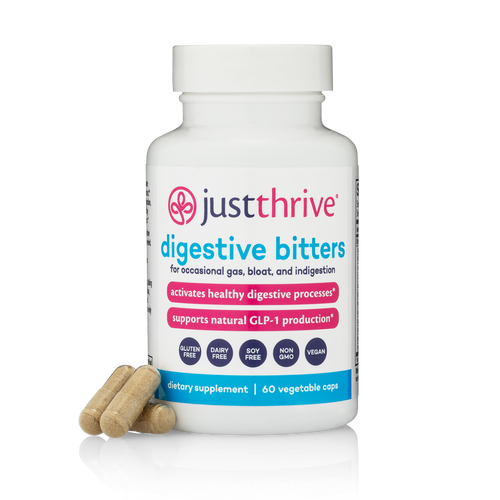Did you know? Each and every one of us has a tiny, butterfly-shaped gland at the base of our throats. And it controls almost everything that goes on in our bodies.
That means if something causes our thyroid to stop working properly, it can have a profound affect on your health. And surprisingly, that can happen if your gut is off-balance. But, there are steps you can take to ensure your thyroid (and your gut) are in prime condition. Learn how gut bacteria influence thyroid health, and discover ways to support your body's master switch.
Hypothyroidism
When your thyroid gland isn’t functioning at full capacity (called hypothyroidism) you could be in for all sorts of unpleasant outcomes.
- Constant weight gain
- Impossible weight loss
- Daytime exhaustion
- Anxiety
- Brain fog
- Cold hands and feet
- Thinning hair (including your eyebrows!)
- Extra dry, pale skin
- Easily breakable fingernails
- Slowed down digestion
If you’ve been struggling with one or more of these issues, resetting your thyroid master switch may be just what your body needs.
And—surprisingly—that thyroid reset starts with balancing your gut bacteria.

Know Your T’s
Your thyroid gland produces some very important hormones. Those hormones control everything from your metabolism to your heart rate to your bone density. So when your thyroid can’t produce enough of those hormones or your body can’t use them properly, you’ll notice the effects.
Your thyroid produces two main hormones:
- T3, triiodothyronine
- T4, tetraiodothyronine (sometimes called thyroxine)
In order to make those hormones, your thyroid needs plenty of iodine—and that’s the first way your gut bacteria come into play. The good bacteria in your gut help your body pull iodine out of food and deliver it to your thyroid. But if your gut is imbalanced, and bad bacteria outnumber good bacteria, that iodine delivery system doesn’t work.
T3 is the active form of thyroid hormone. Your body naturally produces less of that, and converts T4 to T3 when it needs an extra shot. If you can’t convert enough T4 into the active form, you could start to feel those unpleasant effects of hypothyroidism.
This is the second time your gut plays a key role: It converts about 20% of your T4 supplies into T3. But that only happens when beneficial bacteria (probiotics) dominate your microbiome—the mix of trillions of bacteria in your gut.
If your gut is in a state of dysbiosis, where bad bacteria outnumber probiotics, your thyroid gland will suffer… along with your mood, hair, skin, nails, weight, and just about everything else.
That’s because your gut bacteria shape your thyroid function in several ways.
Your Gut Bacteria Affect Your Thyroid
The state of your microbiome has a huge impact on your thyroid… from managing iodine supplies to converting T4 into active T3. But that’s just the beginning of how your gut bacteria affect your thyroid.
In fact, researchers have known for nearly 50 years that gut bacteria run the thyroid functions.[1]
Making nutrients available…or not
When your microbiome is out of balance, it takes a toll on your intestines. That’s because bad bacteria produce substances called LPS toxins that cause inflammation and other damage. That makes it much harder for your body to properly absorb nutrients and deliver them where they need to go. That includes nutrients (such as iodine and selenium) that your thyroid needs to thrive.
On top of that, your gut has first crack at those nutrients. Good bacteria break those minerals down into usable forms and send them to your thyroid. But bad bacteria greedily grab some of the nutrients your thyroid needs. That makes it impossible for your master gland to produce those crucial thyroid hormones.
LPS toxins limit T3 production and use
An out-of-balance microbiome overproduces LPS toxins. On top of all the other destructive things that LPS toxins do[2], they also make a mess of your thyroid system.
Research shows that LPS toxins:
- Reduce the amount of active T3 your body can produce and circulate[3]
- Decrease the activity of special thyroid hormone receptors that your body needs to be able to use T3 and T4[4]
- Activate proteins (called toll-like receptors-4) that slow thyroid function[5]
Those LPS toxins do a lot of damage. But you can tame them by balancing your gut microbiome with spore probiotics… the best choice for turning dysbiosis into a healthy gut.
Dysbiosis damages your thyroid
On top of the nutrient factor and the harm brought on by LPS toxins, medical researchers discovered that dysbiosis could cause thyroid disease… and possibly even lead to thyroid cancer.
For one thing, an extreme form of dysbiosis called SIBO (small intestinal bacteria overgrowth) has direct ties to hypothyroidism.[6] One study found that 54% of people with hypothyroidism also suffer from SIBO.[7]
Another study found that patients with Hashimoto’s thyroiditis (an increasingly common thyroid disorder—especially among women) have dysbiosis.[8] And the worse shape their guts were in, the more symptoms they had.
And it gets worse…
New research shows that patients with dysbiosis were substantially more likely to develop thyroid cancer and thyroid nodules (abnormal lumps).[9]
On the flip side, people with a healthy gut are more likely to have healthy thyroids. So setting up you microbiome so that beneficial bacteria can flourish might be exactly what your thyroid needs to do its job perfectly.
Healthy Gut, Healthy Thyroid
You can keep your thyroid in top shape by making sure your microbiome is in good balance. The best way to do that: Add Just Thrive Probiotic to your daily routine.
Just Thrive contains four clinically proven strains of spore probiotics. Their specialty: shutting down bad bacteria so a wide variety of beneficial bacteria can grow and flourish. When bad bacteria are under control, LPS toxins decrease—and the spore probiotics in Just Thrive have been proven to do just that.[10]
>> Give your thyroid all the love and support it needs with Just Thrive Probiotic
Unsure about trying Just Thrive Probiotic? We can help with that.
EVERY Just Thrive purchase is covered by our Bottom of the Bottle, 100% money back guarantee.
That means you can try Just Thrive Probiotic to see how well it works for you… and we’re betting that you’ll notice a positive difference.
But if for any reason you’re not satisfied, you can ask for a full product refund at any time. Even if it’s 3 months or 3 years later. Even if the bottle is empty!
Sources
- Vought RL, Brown FA, Sibinovic KH, McDaniel EG. Effect of changing intestinal bacterial flora on thyroid function in the rat. Horm Metab Res. 1972;4(1):43-47. doi:10.1055/s-0028-1094095
- Blomkalns AL, Stoll LL, Shaheen W, et al. Low level bacterial endotoxin activates two distinct signaling pathways in human peripheral blood mononuclear cells. J Inflamm (Lond). 2011;8:4. Published 2011 Feb 25. doi:10.1186/1476-9255-8-4
- Fekete C, Gereben B, Doleschall M, et al. Lipopolysaccharide induces type 2 iodothyronine deiodinase in the mediobasal hypothalamus: implications for the nonthyroidal illness syndrome. Endocrinology. 2004;145(4):1649-1655. doi:10.1210/en.2003-1439
- Xu M, Iwasaki T, Shimokawa N, Sajdel-Sulkowska EM, Koibuchi N. The effect of low dose lipopolysaccharide on thyroid hormone-regulated actin cytoskeleton modulation and type 2 iodothyronine deiodinase activity in astrocytes. Endocr J. 2013;60(11):1221-1230. doi:10.1507/endocrj.ej13-0294
- Iaglova NV, Berezov TT. Biomed Khim. 2010;56(2):179-186.
- Patil AD. Link between hypothyroidism and small intestinal bacterial overgrowth. Indian J Endocrinol Metab. 2014;18(3):307-309. doi:10.4103/2230-8210.131155
- Lauritano EC, Bilotta AL, Gabrielli M, et al. Association between hypothyroidism and small intestinal bacterial overgrowth. J Clin Endocrinol Metab. 2007;92(11):4180-4184. doi:10.1210/jc.2007-0606
- Zhao F, Feng J, Li J, et al. Alterations of the Gut Microbiota in Hashimoto's Thyroiditis Patients. Thyroid. 2018;28(2):175-186. doi:10.1089/thy.2017.0395
- Zhang J, Zhang F, Zhao C, et al. Dysbiosis of the gut microbiome is associated with thyroid cancer and thyroid nodules and correlated with clinical index of thyroid function. Endocrine. 2019;64(3):564-574. doi:10.1007/s12020-018-1831-x
- McFarlin BK, Henning AL, Bowman EM, Gary MA, Carbajal KM. Oral spore-based probiotic supplementation was associated with reduced incidence of post-prandial dietary endotoxin, triglycerides, and disease risk biomarkers. World J Gastrointest Pathophysiol. 2017;8(3):117-126. doi:10.4291/wjgp.v8.i3.117














